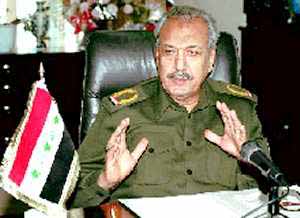Other figures from the most-wanted list captured previously include Saddam's top science adviser, Lt. Gen. Amer al-Saadi; Saddam's half brothers Watban Ibrahim Hasan and Barzan Ibrahim Hasan, and Samir Abd al-Aziz al-Najim, a senior leader of Saddam's toppled Baath party. The Central Command also said Saturday that Khala Khader al-Salahat, a member of the Abu Nidal terrorist organization, had surrendered to Marines in Baghdad. Abu Nidal, who died in Baghdad last year under murky circumstances, led a terror campaign blamed for more than 275 deaths on several continents. In Riyadh, Saudi Arabia, foreign ministers from eight Middle East nations ended an emergency meeting with an appeal to U.S. and British forces to leave Iraq swiftly. The ministers also called on the U.S.-led coalition to fulfill obligations under international law for maintaining security and stability while in Iraq. The joint declaration condemned U.S. threats against Syria for allegedly developing chemical weapons and harboring members of Saddam's toppled regime. The meeting included the foreign ministers of all Iraq's neighbors - Saudi Arabia, Kuwait, Syria, Jordan, Turkey and Iran. Egypt and Bahrain also participated. Their final statement said the United Nations should have a central role in rebuilding Iraq but stressed that "the Iraqi people should administer and govern their country by themselves." Though tens of thousands of U.S. troops are expected to remain in Iraq for months to provide security during its reconstruction, seven soldiers were scheduled to fly Saturday to their home bases in Texas after surviving harrowing days as Iraqi POWs. Three of them suffered gunshot wounds. The seven, freed from a makeshift Iraqi prison six days ago, were scheduled to leave Ramstein Air Base in Germany aboard a C-17 plane. The first stop was Fort Bliss, home of the five members of the 507th Maintenance Support Company; the next stop - Fort Hood, base of the two crewmen whose Apache helicopter was shot down. Natalie Hudson said she finally learned Friday what her husband, Joseph, a member of the 507th, was anticipating most. "He just wants dinner cooked for him," she said. "He's told me what he wants - green chile chicken enchiladas." For U.S. troops remaining in Iraq, one unexpected duty in recent days has been guarding bank vaults that were blasted open by robbers using rocket-propelled grenades. One group of Marines, equipped with machine guns and tanks, stood watch Friday over what they estimated was $1 billion in gold. "Fort Knox doesn't have security like this," said Staff Sgt. Jack Coughlin, standing in a bank lobby as U.S. snipers outside fired at armed robbers still roaming Baghdad's ransacked financial district. On Saturday, U.S. Army soldiers - who are taking over the Marines' security duties in Baghdad - practiced crowd-control tactics with hundreds of Iraqis swarming the Palestine Hotel in hopes of obtaining jobs with the transitional government. Some of the jobseekers trampled over razor wire in an effort to get inside. Elsewhere in Baghdad, throngs of Shiite Muslims - who make up 60 percent of Iraq's 24 million people - marched through the streets in a prelude to their annual pilgrimage next week to the holy cities of Najaf and Karbala. Shiites by the thousands are expected to make the pilgrimage on foot this year, a practice that was discouraged under the rule of Saddam's mainly Sunni Muslim regime. So far, U.S. troops have found no confirmed chemical or biological weapons in their searches across Iraq. No evidence of links between Iraq's government and the al-Qaida terrorist group has been found, either, military officials say. Al-Ani, if he cooperates with the Americans, may be able to provide information on both matters. U.S. officials say he was involved in Iraq's development of tons of the deadly nerve agent VX. He also was accused by U.S. officials in 1998 of involvement with a chemical plant in Sudan also linked to al-Qaida leader Osama bin Laden. Then-President Clinton alleged that the Shifa Pharmaceuticals plant was making a key precursor chemical used in manufacturing VX, a claim that was never independently substantiated. American officials said the Shifa executives who had contact with al-Ani also had ties to bin Laden. They conceded they did not know if al-Ani or other Iraqis knew of Shifa's links to bin Laden. The United States destroyed the Shifa plant with cruise missiles shortly after al-Qaida bombed U.S. embassies in Kenya and Tanzania. Officials of the Shifa plant and Sudan's government denied it was involved in chemical weapons production. |
